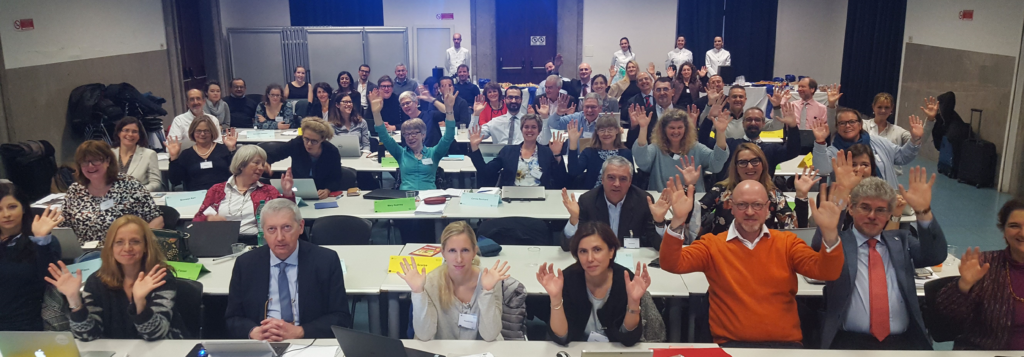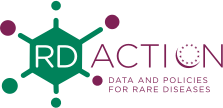
-
Final Agenda for Workshop on ERNs and Clinical Practice Guidelines
-
‘Active’ Agenda for Workshop on ERNs and Clinical Practice Guidelines
-
Final Participant List for RD-ACTION Workshop (6-7 Dec 2017)
-
Presentations Folder
-
Summary of Responses to pre-workshop ERN Survey Dec 2017
-
DRAFT Recommended Practices for the ERN stakeholder community regarding Clinical Practice Guidelines
Executive Summary:
Why Clinical Practice Guidelines? As ERNs are first and foremost about care (albeit with a strong research bent), a vital duty is the requirement to ‘develop and use clinical practice guidelines’ as emphasized in the Legal acts upon which the ERNs are based. For this reason, the CPG topic was chosen as the focus of the latest major workshop organised by RD-ACTION and DG-SANTE. The workshop took place in Rome, on 6th and 7th December, and organisation was a multi-stakeholder effort (WP6 partners UNEW and EURORDIS, DG SANTE, the ERN Coordinator Group Chair, and the coordinators of the Joint Actions for rare diseases and for rare cancers). RD-ACTION Partners Istituto Superiore di Sanità hosted the event.
The workshop united 63 participants, the majority of whom were nominated by the ERNs themselves (23 of the 24 ERNs were represented). In addition, several projects/initiatives have received EC funding to address this issue and it was felt that the fruits of such investment and expertise should be considered in the light of the ERN mission, to help the Networks understand and gauge the applicability of existing cross-cutting (disease-agnostic) tools; therefore, presentations were organised to illustrate the resources resulting from Rare-BestPractices and Orphanet. The approach of the rare cancer community (i.e. the JARC) was also considered. However, the plans and priorities of the ERNs themselves were at the heart of the workshop: a survey had been conducted, to gather preliminary information on these plans, and five quite different Networks presented detailed cases studies on their activities.
A key goal of the workshop was the identification of good practices which could be shaped into ‘recommendations’ concerning several aspects of this vast and complex topic. To achieve this goal, there was a particular emphasis on discussion and plenty of time for debate. The main ‘areas’ highlighted for recommendations include the following:
-
- Central to agreeing the optimal path for ERNs to develop and appraise guidelines is of course the question of methodology: approaches such as GRADE (for generating Guideline) and AGREE (for appraising the methodological rigour and transparency with which guidelines were generated) were discussed, alongside the French methodology for Guidelines pertaining to rare diseases (HAS). The group also agreed the need to incorporate less systematic consensus-building approaches when rarity renders the evidence base too scarce. Before attempting to recommend use of a particular methodological approach, a ‘shortlist’ of the main methods pursued by ERNs will be created.
-
- The group worked to propose recommended practices in collaboration with stakeholders such as professional scientific societies and UEMS (Union Européenne des Médecins Spécialistes) and explored some good examples of how ERNs can complement the work of these essential bodies.
-
- The financial issues and time-commitments of guideline activity were highlighted, and strategies to address the need for ethical engagement with stakeholders such as Pharmaceutical and Devices Companies were proposed.
-
- Several recommendations emerged regarding the optimal engagement with patients and patient organisations in the new ERN era. (The workshop benefited from the active participation of ten ePAG representatives.) Although some excellent examples exist of meaningful patient involvement in generating guidelines and in disseminating them (i.e. playing a key role in producing ay-person versions of guidelines, to increase utility and usability), there are many gaps, and to tackle these it will be necessary to promote patient engagement and also to consider how to support patient organisations in building capacity and replicating the success of peers who have experience in this area.
- The theme of ‘national impact’ permeated the two days of the workshop: participants were very aware that even when guidance is produced, at significant cost and time for all involved, the impact is minimal if countries are not able to implement that guidance. A few strategies to change this were proposed, whilst acknowledging that the challenge will be particularly relevant in counties such as France and Italy which already have binding national legislation and policies relating to the use of Guidelines.
Back to ERN ‘Home Page’

